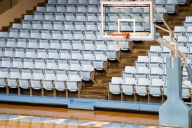You have /5 articles left.
Sign up for a free account or log in.
Purists who think college students need to devote all their time to academics are in for some bad news.
A new study suggests that students with the highest grade point averages exercise “strategic indulgence” when it comes to following college athletics -- they’re adept at balancing study time with a game-day party, without jeopardizing their success in the classroom.
Researchers at the National University of Singapore and Indiana University Bloomington surveyed hundreds of students in three separate studies for their report, which was published recently in the journal Social Psychological and Personality Science.
In the first survey, the authors asked more than 200 college students to consider their willingness to watch a university basketball game in different scenarios. Students first had to answer with the assumption that the game was happening at an intense time in their academic calendar and then during a lighter period in their study schedule.
Researchers found that students with high and low GPAs didn’t differ much in their willingness to engage with college sports, but that students with higher GPAs were much more sensitive to academic conflicts and much more ready to watch games when they posed less of a burden to studying.
“High-GPA students were thus sensitive to the goodness of the opportunities to engage in collegiate sports,” the authors wrote. “They were not single-mindedly avoiding it.”
A little more than 400 students participated in the second survey, which was conducted at a university one week before a men’s basketball home game with a key conference rival.
First students were asked about their general behaviors and attitudes related to the team. Then they were told to envision that they had a midterm exam Friday afternoon, the day following the game.
Students then reported their planning for Wednesday through Friday, indicating by the hour whether they would study or not.
When the game conflicted with preparation for an impending exam, the students with high and low GPAs didn’t vary in how much they studied over the three-day period. However, the students with higher GPAs planned to study more on the nongame days, compared to the students with lower GPAs, who didn’t take game day into account, “suggesting a lack of compensatory planning,” the researchers wrote.
In the third survey, which was administered within 48 hours of another important home basketball game, students were asked about the effect that the game had on their life, and they recalled what they did on a game day -- 530 students answered the questionnaire fully.
They recorded their activities for each hour from 6 a.m. until the following day at 3 a.m., indicating whether they were pursuing schoolwork, non-schoolwork/job/other obligations, leisure activities, game-day activities, sleeping, exercising or other activities.
The students also identified whether they were basketball fans and the importance of academics to them. And they were asked how much the game positively affected their day.
Students with the higher GPAs who were basketball fans spent more time on game activities and enjoyed them more, the researchers found. But students with lower GPAs allocated less game time, even when they reported being devoted fans.
“We believe that high-GPA students strategically engaged in collegiate sports,” the professors wrote. “Indeed the more time high-GPA student spent on game activities, the more they derived a positive experience from it.”
The researchers wrote that the findings contribute to a “more holistic portrayal” of academically successful students -- that students who thrived in the classroom avoided sports-related pleasures when needed, but when they did indulge, it was “strategically, rather than impulsively.”
“Hence, engaging in pleasurable nonacademic activities is not always an impulsive act that reflects self-regulation failure,” the researchers wrote.
“People who are good at resolving goal conflicts are not simply better at avoiding temptations. They may also be better at integrating the enjoyment of desires into their long-term goal pursuit.”








